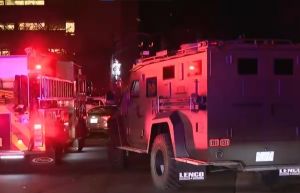Oskar Groening, also known as the Nazi "bookkeeper," testified anew before the Lueneburg state court in one of the biggest Holocaust trials in Germany to date. He was being tried for 300,000 counts of accessory to murder involving at least 450,000 Hungarian Jews killed in the German facilities at Auschwitz-Birkenau from May to July 1944.
Groening, 94, was an S.S. sergeant tasked with the inventory of cash and valuables that were taken from Jews herded in concentration camps. In a prepared statement read before the court, Groening expressed his remorse over the atrocities and admitted to his "moral guilt," according to a Reuters report. His testimony included chilling details of the genocide in the German-occupied Poland. For instance, he described Jews being brought in cattle carts and driven straight to the gas chambers to be killed, according to the New York Post. At one point, Groening explained that "the capacity of the gas chambers and the capacity of the crematoria were quite limited. Someone said that 5,000 people were processed in 24 hours but I didn't verify this."
Groening's testimony is considered crucial to the trial, which is expected to reach a verdict at the end of July. Although Groening did not enter a plea in the German system, he hopes to escape a 15 year jail sentence, with the argument that he was not directly involved in the killings. Holocaust victims criticized the testimony, noting that Groening admitted to moral guilt but not to any legal culpability.
Irene Weiss, who is a Holocaust survivor at Auschwitz and co-plaintiff in the trial, insisted Groening's role can never be downplayed as he represented "the terror and the depths to which humanity can sink," according to the New York Times. This is aligned with what the prosecution seeks to prove, that Groening's guilt is established in his role as part of the machinery that enabled the systematic killings to take place.
© 2025 HNGN, All rights reserved. Do not reproduce without permission.








